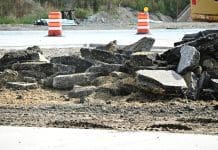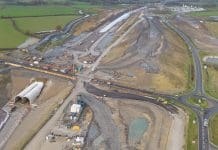Michael Riordan, UK managing director of construction consultancy Linesight, offers some important steps to take to protect sites, projects and businesses during the coronavirus pandemic
As the COVID-19 pandemic continues to change how the world operates, the construction industry is facing unprecedented disruptions. Caught between essential and non-essential services on a project-by-project assessment, construction project closures are changing on a daily basis. Stakeholders are constantly adjusting to the implications around the changing government guidance and announcements, while simultaneously trying to keep their projects, businesses, staff and sites operational, protected and afloat.
Whether your construction project is ongoing or closed, there are important steps for all construction sites to take to ensure that the site, project and business is secured for the duration of the pandemic.
Security and protection
With rules around essential services changing on a daily basis, even sites that are currently operational should prepare for closures by creating a site shutdown or demobilising plan.
For sites that are currently shut down, this can be used going forward to ensure that the site is secure and maintained while closed. For operational sites, if a site shutdown ever does take place, it will ensure that everyone is prepared for the closure and that it can be done safely and efficiently. The plan should include:
- A list of site materials and services that need to be secured and the manner in which they will be protected.
- An emergency access plan for necessary maintenance and inspections, or for emergency vehicles should the need arise.
- A services isolation plan for gas, water and other services. Keep in mind that some services may need to remain operational to preserve the integrity of the site.
- A plan to protect the site, materials and building from weather, lack of use and unauthorised access.
Some projects may continue to require daily or weekly inspections by authorised personnel to maintain security. Define in advance a list of necessary personnel who will perform these inspections and ensure that they have written authorisation to be on the site, in case authorities question them. Then, plan what an efficient and effective inspection will look like. Document aspects of the site and the work that will need inspection, the inspection protocol and the frequency of the inspection. Fire safety systems and gas, water and electricity services are important areas to consider during inspection.
Ensure that the plan incorporates health and safety, as well as social distancing guidelines, and prepare a schedule in advance of who will be visiting the site and when. Installing remote camera monitoring equipment can help to maintain 24-hour site security and can also help facilitate remote inspections.
Before shutting down the site, there are some necessary actions that need to be performed.
- First, it will be important to document, with notes and photos, the site, and all equipment and materials.
- Create a checklist so that when the site reopens, all materials and progress can be accounted for.
- Remove or secure anything that is flammable or could be a fire hazard to minimise risk during the shutdown.
- Secure and protect any unstable or loose materials.
- Perform a deep clean of the site and sanitise anything that may have been touched or handled by individuals. This is crucial for minimising the impact of the virus, especially if anyone has tested positive for it or has been in contact with anyone who has tested positive.
- Check the border security of the site, including fences and locks, to minimise risk of unauthorised access.
- Finally, notify all deliveries of the site shutdown, and reschedule or delay shipments.
Contracts, insurance and other legal considerations
Due to the uncertain nature of these times, there may be impacts to worker contracts, letters of intent, equipment purchases or rentals, and other legally binding contracts. Seek legal advice to ensure that you understand the nature of the closure and the impact of it. Areas to consider legal advice for include contract negotiations or renegotiations, engagement with future tenants or purchasers of the property, engagement with funders or lenders, and employment law. None of us have seen a pandemic of this nature in our lifetimes, so it is understandable that businesses may not understand the legal implications of closing down a worksite. A lawyer can help you navigate this uncertain territory.
It is also important to liaison with your insurance to see what will be covered in the event of damages, especially when the worksite is closed. Understand where the COVID-19 pandemic falls for insurance purposes – is it considered a natural disaster or an unexpected event? – to understand what actions can be taken.
Create a risk assessment, use the documented state of the worksite and equipment to establish whether insurance policies will cover the risks identified and review the procedure for making a claim. Also, make sure that your employees review and understand benefits information, especially in regards to travel and health benefits.
During this time, governments are constantly reviewing policies relating to businesses and employees. Make sure that you’re up-to-date on all policies that affect you, your business and your employees or contract workers. Review policies surrounding loans, small-to-medium businesses, or non-essential businesses to see if you can receive financial aid if needed.
Also, if there are any upcoming contracts, contract reviews or renegotiations, try to delay or postpone these until after the pandemic. Projects are currently being delayed indefinitely in some countries, and it will be best to wait until the impacts of the pandemic have lessened.
Other considerations
All industries, including construction, are facing massive uncertainties about the status of their work. Even if your construction project is deemed essential at the moment, ever-changing legislation means that construction projects could shut down at any moment, leaving companies unaware of when work will resume. No matter the status of your project, it is important to review the financial position of your business, especially in regards to cash flow, statutory sick pay, and tax and banking issues. If possible, establish a contingency fund to cover unexpected issues that may arise.
With no set date for return-to-work orders, it may feel overwhelming to review finances, but it will be increasingly necessary. Also, if you are in the financial position to continue to support suppliers, consider continuing payments during the shutdown. That way you can ensure your key partners will still be there when the project begins again.
Some aspects of your business may still continue remotely during the pandemic, even if the worksite is closed. Departments such as IT, communications and payroll can, and should, be maintained remotely. Ensure that you’ve supported those departments with the necessary technology and equipment to work remotely for as long as needed. It will also be necessary to continue contact with all departments and key personnel. Schedule regular briefings and meetings on the status of the project and the actions taken by the team. This will help all employees feel involved and aware during the pandemic.
Supply chains were one of the first areas of construction to be disrupted by the pandemic. If your site is still operating, now is the time to source supplies locally, if possible, to help maintain the economy. If that is not possible, find alternative suppliers to ensure that construction can be continued. Collaborate with them to ensure timely and safe delivery schedules. If the site is closed, ensure that there is adequate storage for all supplies.
Preparing for the unknown
Daily, new projections are emerging about how this pandemic will play out. Alongside these developments, new government regulations are taking form. To be prepared for anything that arises, businesses must stay updated on all relevant policies and procedures.
Although there is currently no end in sight, shutdowns mark an important time for businesses, where project timelines can be reviewed and deliverables can be reassessed. This, along with the tips above, will help to make the transition back to the construction project easier for everyone involved.
Michael Riordan
Managing director, United Kingdom
Linesight
+44 (0)207 784 7330














